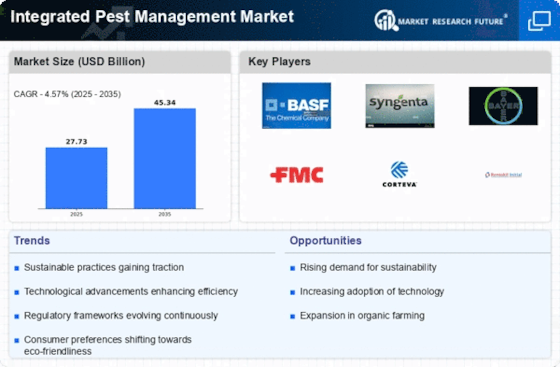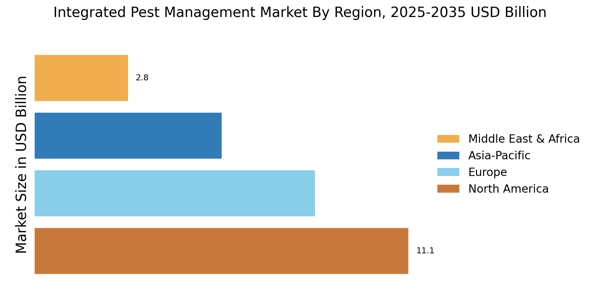Rising Demand for Organic Produce
The increasing consumer preference for organic produce is a notable driver in the Integrated Pest Management Market. As consumers become more health-conscious, they seek food products that are free from synthetic pesticides and chemicals. This trend has led to a surge in organic farming practices, which often rely on integrated pest management strategies to maintain crop health while minimizing chemical use. According to recent data, the organic food market has been experiencing a compound annual growth rate of over 10%, indicating a robust demand for sustainable agricultural practices. Consequently, farmers are increasingly adopting integrated pest management techniques to meet consumer expectations and regulatory standards, thereby propelling the growth of the Integrated Pest Management Market.
Increased Awareness of Pest Resistance
The rising awareness of pest resistance to conventional pesticides is a significant driver in the Integrated Pest Management Market. As pests evolve and develop resistance to commonly used chemicals, farmers face challenges in maintaining effective pest control. This situation has prompted a shift towards integrated pest management strategies that combine biological, cultural, and chemical methods to manage pest populations sustainably. Research indicates that integrated pest management can reduce the incidence of resistance development, making it a more effective long-term solution. Consequently, the growing recognition of pest resistance issues is likely to bolster the adoption of integrated pest management practices, thereby enhancing the growth prospects of the Integrated Pest Management Market.
Environmental Awareness and Sustainability
Growing environmental awareness among consumers and policymakers is driving the Integrated Pest Management Market. As concerns about biodiversity loss and ecosystem health rise, there is a push for sustainable agricultural practices that minimize environmental impact. Integrated pest management offers a holistic approach that balances pest control with ecological preservation. This shift towards sustainability is reflected in various agricultural policies that encourage the adoption of integrated pest management techniques. For example, several countries have implemented incentives for farmers who adopt environmentally friendly practices, further stimulating the demand for integrated pest management solutions. This trend suggests a promising future for the Integrated Pest Management Market as sustainability becomes a priority.
Technological Advancements in Pest Control
Technological innovations play a crucial role in shaping the Integrated Pest Management Market. The advent of precision agriculture, drones, and smart pest monitoring systems has revolutionized pest control methods. These technologies enable farmers to apply pest management strategies more efficiently and effectively, reducing the reliance on chemical pesticides. For instance, the use of data analytics and machine learning allows for real-time monitoring of pest populations, leading to timely interventions. The market for precision agriculture is projected to reach several billion dollars by the end of the decade, highlighting the potential for growth in the Integrated Pest Management Market as these technologies become more widely adopted.
Regulatory Support for Sustainable Practices
Regulatory frameworks increasingly support sustainable agricultural practices, significantly influencing the Integrated Pest Management Market. Governments worldwide are implementing policies that promote integrated pest management as a viable alternative to conventional pest control methods. These regulations often include guidelines for pesticide use, encouraging farmers to adopt integrated approaches that reduce chemical dependency. For instance, initiatives aimed at reducing pesticide residues in food products have led to a greater emphasis on integrated pest management strategies. As these regulations evolve, they are likely to create a more favorable environment for the growth of the Integrated Pest Management Market, as compliance becomes essential for agricultural producers.

















